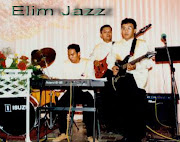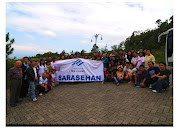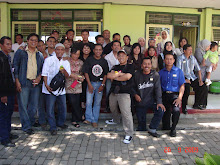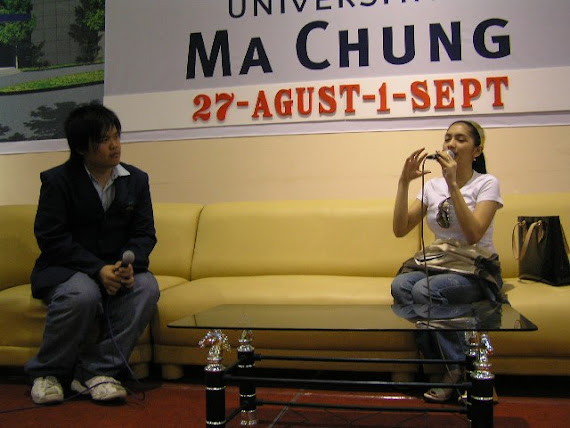The so called cultural concept gotong royong that most Indonesian are proud of turns out to be the one that gives rise to devastating effects on corrupted mentality of individuals. Through deconstructive angle, gotong royong is seen in a bit different taste.
During the Old Order gotong-royong became sacred words loudly proclaimed by the former Indonesia President Sukarno. He once said that even if Pancasila squeezed to Ekasila, then the later would be gotong-royong. In the same way, the concept of gotong royong was always sounding and became the important terminology during the Soeharto’ reign (Fauzansa 2006).
The nature of mutual help contained in the concept of gotong royong is by no means monopolized by Indonesia. Helping other people who are in need without expecting anything in return is, in fact, a quite universal picture.
In the case of Indonesia, gotong royong was a quite different case. Gotong royong is the representation of a value system that calls for the commitments on the parts of people who belong to a particular society. Koentjaranigrat (1996) has clearly classified four primary reasons underlying the concept of gotong royong: 1) a man is not living alone but surrounded by a community and nature. He is a mere thing living under a macro cosmos, 2) as such his existence is greatly dependent on other people, 3) for that reason, he has to maintain a good relationship with his fellowmen, 4) and to conform to other people’s expectations.
This personal-community patronage is indeed inseparable with the prevailing facts at that time where: 1) agricultural lands are still fairly large, 2) and become the primary living subsistence for the whole community. With such an extensive size of the lands, it is unlikely that people do agricultural activities themselves, whether to cultivate or to gather crops, not to mention to expect satisfactory results in coming future. In this case, agricultural activities are known as the surface structure of social interaction.
With regard to a deep structure analysis, people at the time connected the gotong royong concept with mysticism and regarded it as a revelation descended from above. In fact, they took it for granted. They never asked why we had to do so. They never and ever proposed any questions; instead, the value itself deeply penetrated into their hearts, laying dormant and becoming what Carl Gustav Jung called with archetype.
By then, gotong royong was indeed very powerful. It was very powerful indeed because it was just like the Word of God. You have to do it no matter what…..in fact people unconsciously believed it.
People were too afraid to say no for not getting involved in gotong royong. None of them announced their opposing views publicly. Otherwise..a god would be angry and so would the crowd. The entire society would abandon him
Living in alienated atmosphere was completely a nightmare. They would outwardly do quite opposite to what they felt inside. But they did from finger to bone to manipulate small explosions in their inner realm.
Regretfully to say that a deconstructive angle sees another side of gotong royong that gives a birth to collective unconsciousness or what we call by hypocrisy. The face of hypocrisy can be seen in the following aspects:
1) People have a vertical orientation. If they did the job..they would do it not because they really wanted to do it or realized it was a part of their jobs, but primarily just intended to please his or her supervisor or boss.
2) People become totally opportunists. They took immediate advantage, often unethically, of any circumstance of possible benefit.
Their frustration was piled up, mounting to a great extent. Hypocrisy was unconsciously inherited from generation to generation. It did not come into a view but stayed dormant deep inside community.
What happens nowadays?
The complication continued happening along with the change of society. As society got multiplied along with the influx of newly born population, the lands seemed to get narrower and narrower. People no longer depended on the agriculture lands but vigorously switched to another favorable sector to support their living. They had to compete with each other to get “sesuap nasi” in a new wild world, a place where: 1) real and delivery sectors became another dominant aspect of economics, 2) rewards were rationally granted according to strict quantitative measures, 3) I was more important than us… 4) etc…
They progressively moved away from their former group benefactor. People became fully pragmatic in fact this idea seemed to be more rational than any….: what would benefit me if I spent my time doing this? It was a relatively strange thought, if not crazy, as compared with those found in the preceding times.
However, they often go to extreme, neglecting any mode of rules and ethics. What they have in mind is that they live for eating not eating for live….
This extreme pragmatics minded was then married to “unconsciously frustrated feeling” inherited from their ancestors. This marriage gives birth to a newly born corrupted mentality. No wonder then if you see in our society if: you see people in the society who always publicly kept saying to people to do good things while avoiding making deceitful pretenses but unfortunately they were people who a) stole public funds for their own interest, b) slept with his affair and seen naked in the web, c) persecuted others while justifying their immorality in the name of the absolute truth.
The truth is that they are hypocrisy in nature, wanting to look good outwardly but inwardly possessing opposite nature. How irony….
Reference
Fauza, 2006. Dekonstruksi Derrida, Upaya Untuk Memecah-mecah Konsep http://fauzansa.wordpress.com/2006/01/06/gotong-royong-masih-adakah/
Koentjoaraningrat.1996, Kebudayaan Mentalitas dan Pembangunan.Gramedia
Jumat, 04 Juli 2008
Langganan:
Posting Komentar (Atom)







1 komentar:
This is surely a result of profound thought. But i still cannot see how the gotong royong concept serves as a cause, either indirect or direct,of the hypocrisy or degradation. If I may conclude, the forced obligation to commit oneself to gotong royong fuels the hypocrisy. Is that right? But what about the facts that even people who are outgoing and certainly into gotong royong also commit crimes and banality?
Posting Komentar